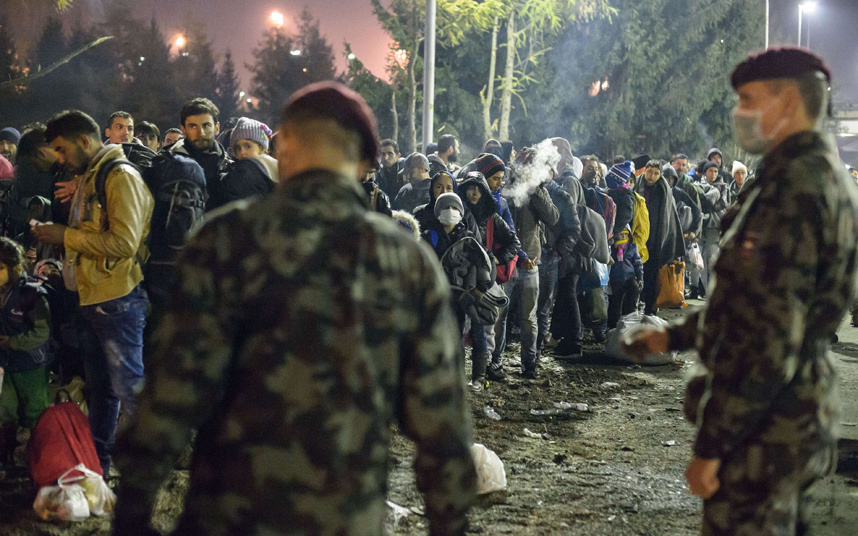Alwaght- After Slovenia, Croatia and Serbia, the Macedonian government has said that it decided to fully close down its borders in the face of all refugees. Nikola Poposki, Macedonia's foreign minister, has said any decision that would be taken by the European countries on the movement of the refugees would be implemented by the Republic of Macedonia in its borders with Greece. Furthermore, the spokeswoman for Macedonian Ministry of Interior Natalija Spirova Kordic has asserted Macedonia would take steps in accordance with the decisions made by the countries which are located alongside the Balkans.
The Austrian Foreign Minister Sebastian Kurz, who is one of the principal upholders of closing down the European borders to the refugees, has maintained that Austria wanted help of all of the world countries to put an end to the issue of immigration, including the crisis of refugees. He said that there were criticisms directed against his country about the mistreatment of the refugees seeking shelter in the EU. Kurz added that the EU had given Austria no support or even the necessary consultation, therefore, Vienna has over and over highlighted its right to do anything to protect the country's and citizens' security, including blocking the country's borders with the Balkans as well as amending the EU-passed refugees admission quotas. "The pathetic pictures of the refugees stuck in Macedonia-Greece borders are highly terrible, “continued Mr. Kurz. "But, we cannot easily allow Greece to let the refugees in the EU, and we need to protect our external borders," the Austrian foreign minister added.
As Macedonia and Greece close their borders to the immigrants, which leads to over 40,000 migrants and refugees' straying in Greece, the refugees and traffickers would possibly choose alternative routes, causing problems this time to other countries of the region like Albania and Italy. Rome and Tirana have agreed that the police forces of the two countries would cooperate to prevent possible intrusion of refugees into Albanian territory. The two countries' joint patrols of the police forces are set to begin soon near the Greek borders. Italy is concerned that shutting down of the Balkans travel routes would push the refugees to go to Albania and from there to Italian soil.
While all of the Balkans region's countries, excluding Greece, are in favor of closing their borders to the refugees, the German Chancellor Angela Merkel is one of the major critics of shutting down the Balkans routes to the refugees. The German chancellor has said that it was not a suitable solution to the refugees' issue to close the borders in the face of them. "Perhaps with this solution smaller numbers of refugees would arrive in Germany, but instead we should see every night on TV the refugees who have made their way to Greek coasts. Such sights would not have good repercussions in the long run," said Mrs. Merkel. Angela Merkel, a supporter of Greece in the refugees’ case, has maintained that Germany would not leave Greece alone in dealing with the refugees’ problem, adding that to make a balance; a European settlement must be found.
The closure of the borders has drawn the opposition of the international and human rights organizations. United Nations High Commissioner for Refugees in a meeting of Human Rights Council in Geneva has asserted that the EU-Turkey refugees deal was worrisome, expressing his concerns over collective deportation of refugees, which was "an illegal act." The EU was set to discuss the refugees' crisis before its March 17 and 18 conferences. Such a massive influx of refugees flowing to Europe has been unprecedented since the Second World War.
The UN's Refugees Agency believes that if a third-party country is responsible for assessment of asylum applications, the refugees must be sent to this country. Once announced qualified for admission, the accepted people must be granted right of residence according to the internationally-approved standards. They have to be granted full access to such services as education, employment, medical care and even social support once it is needed. The legal protection should cover any procedure which is tasked with evaluation of asylum application.
As Greece's Idomeni border crossing is declared totally closed down, the status of 14,000 refugees goes unclear. The situation is catastrophic in Idomeni and the recent days' raining has made the conditions even worse for the refugees, resulting in outbreak of different types of winter time diseases especially among the children. The Greek Ministry of Interior's officials have predicted that within two weeks the conditions in Macedonia borders would return to normal, however, refugees could not be dealt with by tear gas because a majority of them are women and children. The Greek government seeks to convince the refugees that the Macedonian border with Greece is closed for good and that they should be put in the camps so that they are provided with residence and food until their conditions are settled.
The Minister of Shipping and Island Policy Thodoris Dritsas believes that despite the fact that the borders have been closed, in the past three days the number of refugees who came to the Greek islands arriving from the Turkish coasts has seen an increase. The number of refugees who are registered is now touching 42,000. From this number, 12,000 are in Idomeni border camp, 10,000 in the islands, 3,000 in Port of Piraeus and the rest are in the camps in Athens, Thessaloniki and other Greek regions. According to the figures published by EU's border agency Frontex, in the last three months of 2015, 484,000 refugees and immigrants entered Greece coming from Turkey, as 466,000 of them arrived in the European countries through the Balkans. There are speculations that the Balkans countries eye deporting to Greece the Iraqi, Afghan and Syrian refugees who got stuck in these countries as a result of closure of Slovenian borders.



























